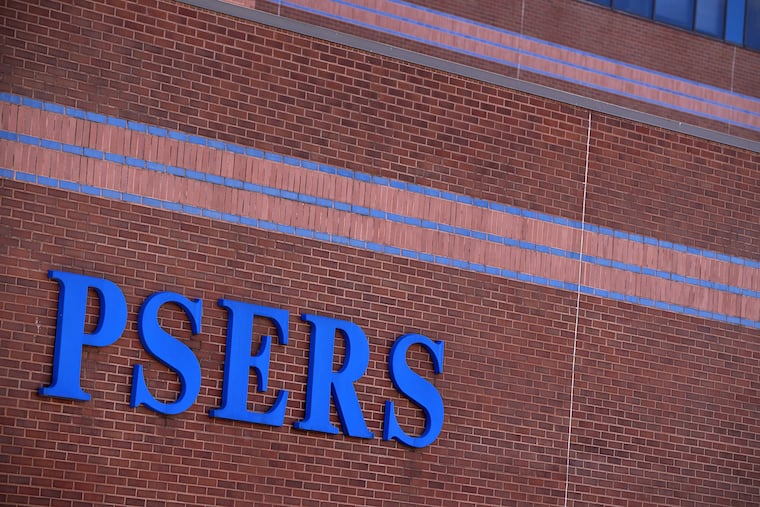Latest PSERS development: SEC probes big Pa. pension fund, asking about ‘compensation and gifts’ to staff
The FBI and federal prosecutors launched a criminal probe of the $70 billion PSERS plan in March after the fund’s board revealed doubts about the figure it endorsed for financial results in December.

The U.S. Securities and Exchange Commission has joined the FBI in the investigation of Pennsylvania’s biggest pension fund, subpoenaing records about its board’s adoption of a false figure for its financial performance — and about improper “compensation and gifts” possibly offered staff.
State employees are forbidden from accepting such gifts under a ban imposed by Gov. Tom Wolf. The subpoena given the PSERS school pension plan Friday was the first indication that investigators are looking into possible presents or money from investment advisers and consultants.
The FBI and federal prosecutors launched a criminal probe of the $70 billion PSERS plan in March immediately after the fund’s board issued a brief statement revealing its belated doubts about the figure it endorsed in December for financial results.
Prosecutors’ multiple subpoenas ordered top PSERS officials to give information to a grand jury about the mistaken calculation and, in a seemingly unrelated matter, the pension fund’s $5 million appropriation in 2019 to buy real estate near its headquarters in Harrisburg.
While prosecutors and the FBI build criminal cases, the SEC pursues civil complaints. It has broad power to impose fines, discipline financial players, and order reforms. It can’t put anyone in prison.
PSERS spokesperson Steve Esack said Saturday that the fund had no comment on the SEC action.
The board’s math mistake on its financial performance was no minor error.
PSERS — the Public School Employees’ Retirement System — oversees the pensions for more than 500,000 working and retired educators. Under state law, many school workers must pay more into the pension system when it fails to meet certain financial targets.
In December, the 15-member PSERS board said profits were just barely good enough to spare the teachers such a hike. Then, in April, it reversed course and adopted a new, lower figure. This triggered an increase in payments for more than 100,000 teachers and other school employees hired since 2011. More veteran teachers were given a pass.
The SEC subpoena sought documents and communications, both external and internal, from the pension plan from December to the present regarding “any errors or recalculation of average rate of returns” and the “risk/share” process, a reference to the law that says teachers must share in the risk and pay more when returns are disappointing. It also asked for records about board votes, people familiar with the matter said. It was sent to Jackie Lutz, the fund’s chief counsel.
The securities agency reportedly has subpoenaed Hamilton Lane Advisors LLC, a suburban Philadelphia-based firm that reviews PSERS’s stake in private investment firms, for information about its dealings with the pension fund. The subpoena explicitly said Hamilton Lane was not a target of the inquiry. Katie McGann, a spokesperson for Hamilton Lane, declined to comment.
Board members were alerted to the new subpoena later Friday by lawyer William Sullivan, of the Pillsbury Winthrop Saw Pittman firm in Washington. PSERS hired his firm in April to deal with the federal probe. Sullivan is a former federal prosecutor who helps lead his firm’s white-collar criminal defense and corporate investigations team.
Besides Pillsbury, the fund has brought in two other law firms since the first subpoenas hit — Philadelphia-based Morgan Lewis & Bockius and the international firm of Womble Bond Dickinson. The pension plan has also been paying for individual lawyers for at least eight employees.
The pension fund has said almost nothing about the calculation mistake beyond acknowledging the error six months ago. In internal reports obtained by The Inquirer, a key consultant, Chicago-based Aon Investment Consulting, seemed to shoulder the blame. It traced the incorrect result to nothing more than “clerical data-entry mistakes” by its staff.
Taxpayer-supported PSERS itself had denied an Inquirer request, filed under the state’s right-to-know law, for documents about the mistake. The fund also alerted Aon and two other consulting firms, ACA Compliance Group and Buck Global LLC, to the request. The news organization is appealing the denial.
Last year, PSERS paid $762,000 to Aon and $226,000 to Buck for their work on the calculation, among other tasks. It also paid $60,000 to ACA to spot-check its math.
PSERS relies heavily on outside consultants and money managers — too heavily, critics say — as the fund’s results have lagged those of other pension funds. Until this year, the fund permitted outside firms to book extravagant travel arrangements for the fund’s 60-member investment unit. The money managers would front the cost and PSERS would later pay them back.
PSERS says it paid more than $700 million, at last annual count, in fees and profit sharing to more than 150 Wall Street firms and other private money managers. It also spent more than $14 million on consultants, such as Hamilton Lane, Aon, ACA, and Buck Global, records show.
When the pension system in December adopted the bogus number for its performance, it did so despite the objections of three board members. The three, who abstained from approving the figure, were former State Treasurer Joseph Torsella, a Democrat; State Rep. Frank Ryan (R., Lebanon); and Richard Vague, the state banking secretary appointed by Wolf, a Democrat.
At that time, PSERS’s chief investment officer, James H. Grossman Jr., told the critics their concerns were groundless. “We did our due diligence,” he said. “We covered it. I’m not worried about it.”
Torsella had previously warned top PSERS executives that the plan was newly using unaudited data instead of its own previously certified numbers. PSERS has refused to respond when asked if Torsella’ s criticism was confirmed by the subsequent reviews of the math.